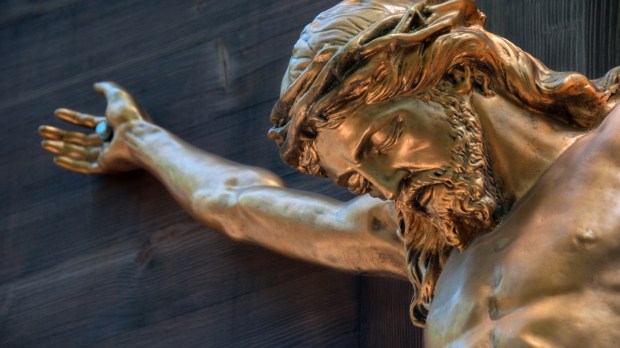Whenever we speak of the Passion of the Christ, a particular understanding of the word “passion”is at play. It seems to refer to profound suffering on the one hand and unwavering love on the other. But the word itself might be somewhat problematic, as its use and implications depend on the contexts in which it is used.
One can be passionate about, let’s say, Baroque art – a passion that is entirely different from that of Christ.
Or is it? Why is this particular word used?
Active and … passive
To truly understand the Passion we must take a look at its linguistic (and theological) roots, exploring the subtle dance between active and passive (no pun intended) meanings that give this word such power.
First, the English “passion” comes from the Latin passio. The Latin, in turn, seems to derive from the Greek pathos – although there is no real consensus on this matter. In any case, the Latin word once meant “affection” and not necessarily “suffering.” One can be positively affected by beauty, for instance, without this affection translating into pain or suffering.
And still, this first definition fits perfectly with the narrative of Jesus’ last days, culminating in his agonizing death on the cross. His physical and emotional torment, from betrayal and arrest to scourging and crucifixion, embodies this core meaning of passion as suffering – physical and psychical, to the very limits of human endurance, and beyond. He was certainly on the passive, sufferingend of things.
But the story doesn’t end there. While Jesus undeniably suffered immensely, his actions during this time were far from passive. He actively chose love and forgiveness, resisting bitterness and resentment. He engaged in conversation (even from the cross), offered comfort to fellow sufferers, and ultimately gave up his life, in an ultimate act of loving trust.
Herein lies the crucial distinction between the active and passive aspects of passion. While Jesus certainly endured excruciating suffering, it wasn’t just a passive acceptance. It was a conscious choice fueled by an inner fire – a passion, in the more modern sense of the word. This passion wasn’t about personal desire or pleasure, but about a burning love for humanity and a deep commitment to fulfilling his divine mission.
Moreover, the word “passion,” at least in its contemporary use, resonates with additional layers of meaning. It evokes themes of devotion, commitment, and zeal – as when one is passionate about something. Jesus’ unwavering conviction in his way, despite the pain and rejection he faced, embodies this passionate spirit. This aspect inspires believers to cultivate similar dedication in their own faith journeys.
Trying to explain a unique reality ….
It’s important to note, however, that the word “passion” in this specific context does not exist in the original Greek Gospels. The closest Greek term would be, again, pathos, which has a wider range of meanings, including suffering, emotion, and experience. The Latin passio was used by early translators to capture the unique significance of Jesus’ suffering.
The English word “passion” eventually branched out from its purely theological meaning to include the broader connotations of strong emotion, zeal, and desire. This evolution stemmed from the inherent connection between intense suffering and strong emotions. Moreover, Jesus’ passion for humanity itself could be seen as a source of inspiration for passionate pursuits in other areas of life.
Thus, the term “Passion of the Christ” goes far beyond mere suffering. It encompasses a complex interplay of pain, love, commitment, and transformation. It represents not only the final days of Jesus, but also the lasting impact of his sacrifice on faith and individual lives. Understanding these interwoven meanings, along with the linguistic evolution of the word, allows us to appreciate the true depth and power of this significant term in the Christian vocabulary.
Passions in the Catechism
Now, the use of the word to refer to Jesus’ passion is separate from what we know as “the passions” in the moral life.
The Catechism has a whole section exclusively dedicated to studying passions. Delving into the complex world of human emotions it highlights two fundamental facts. First, that passions are as natural as unavoidable. Second, their profound impact on our moral compass. The fact that they are natural does not mean they are not indomitable.
First, the Catechism explains the basic nature of passions, in this sense. They are inherent emotional responses, like love, fear, and joy, that arise from our sensitive appetite, and eventually guide us towards perceived good or evil: We are drawn to what we perceive as good, and flee from what we deem bad. These feelings bridge the gap between our senses and intellect, drawing upon our experiences and shaping our desires. While numerous passions exist, love takes center stage, described as the fundamental movement of the heart towards good. In Augustine’s famous formulation, my love is my weight.
However, the Catechism clarifies that passions themselves are morally neutral. Their goodness or evil hinges on how they interact with reason and will. If we allow reason to guide our emotional responses, directing them towards positive actions, the passions become powerful tools for moral good. Conversely, an evil will can surrender to and even amplify negative emotions, leading us down a harmful path.
The Catechism emphasizes that the strength of these feelings does not define us. Even intense emotions hold no inherent moral weight. Instead, it’s how we choose to manage them that truly matters. This requires aligning our passions with reason and, ultimately, with God’s will.
Finally, the Catechism offers hope for integrating even challenging emotions into a virtuous life. Through the Holy Spirit’s work, even pain, fear, and sadness can be integrated into a life filled with love, mirroring Christ’s own experience: the meeting of human emotion and divine beatitude.



